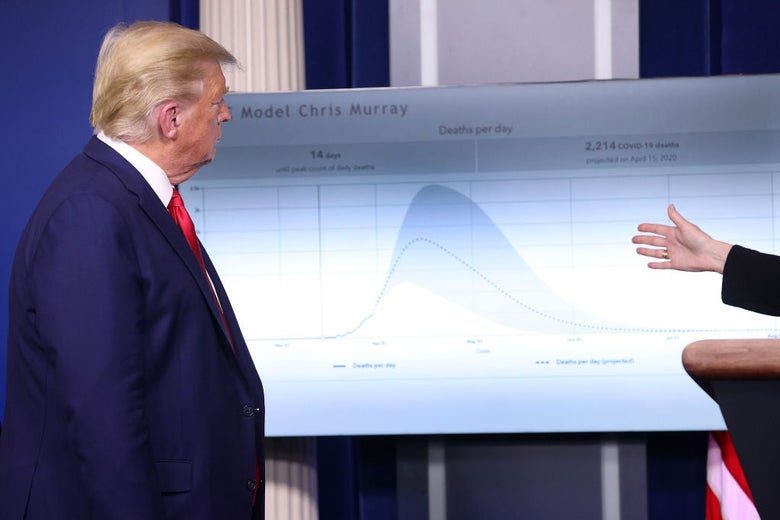
The president looks at a chart he should have looked at two months ago.
Win McNamee/Getty Images
Donald Trump’s epiphany/admission that the coronavirus is going to kill (at least) tens of thousands of Americans, and that stay-at-home policies need to continue throughout April, has convinced a number of pundits that he is now treating the pandemic with grave seriousness. Unfortunately, this is not true. What is happening is that Trump is acting like he is treating the pandemic with grave seriousness. This is better than the alternative, because it means (for the time being, at least) that red-state governors will feel they have leeway to order lockdowns and that public-health experts Deborah Birx and Anthony Fauci will get to give good advice to U.S. residents from the White House lectern without being immediately contradicted by the boss. But, as a spin around the news emphasizes, it does not mean that Trump or anyone else in the White House is actually administering a federal response to the crisis.
Politico reports, for example, that Mike Pence’s coronavirus task force has only just now asked U.S. federal agencies to stop sending protective equipment for medical personnel to foreign countries, something that has apparently been going on for months despite widespread shortages domestically. The Washington Post reports that numerous state governors have received only a “fraction” of the PPE and ventilators they’ve requested from the Federal Emergency Management Agency—which meanwhile told Politico that it has not “has not actively encouraged or discouraged” private U.S. companies that manufacture PPE from selling their products overseas, which is something that has also taken place. The one state that has consistently gotten its requests fulfilled is Florida, whose governor, Ron DeSantis, was until 2018 one of Trump’s leading supporters in the House. (A “White House official” told the Post that Trump pays special attention to DeSantis’s requests because he “knows Florida is so important for his reelection.” Cool!) The Defense Production Act, which allows the federal government to legally direct private manufacturing, has still only been used once on a coronavirus-related order—a General Motors ventilator project that is still being developed, and which the company appears to have planned largely on its own.
The U.S., meanwhile, still does not have enough COVID-19 testing capacity to promptly determine whether every current patient with COVID-like symptoms has the virus or not, which is a problem for medical professionals making decisions about allocating treatment resources and PPE. (Ubiquitous testing will also be required to reopen public spaces; countries like South Korea have been able to reduce social distancing by testing everyone who shows symptoms so that those who are positive—as well as the people who they are known to have recently interacted with—can immediately be quarantined.) The Atlantic reports that the private company Quest Diagnostics has accepted a large number of samples that it’s been unable to process, creating a backlog of tests that is particularly concentrated in California, which has 57,400 pending tests but on Monday, for example, received results for only 1,500 of them. The magazine quotes a Washington state lab director, moreover, who says that Quest’s results “time and time again have proven not to have the best quality.”
On March 13, Trump gave a press conference in which he said Google was developing a website which would allow individuals to find drive-in testing sites at Target, Walgreens, Walmart and CVS stores nationwide. As of Tuesday, only five such locations had actually opened. A company owned by Ivanka Trump’s brother-in-law reportedly worked on developing a similar website, but it was never launched and the project has been canceled. On March 21, an administration official said that there would be 27 million tests “into the market” in the U.S. within a week. As of Monday, only one million tests had been conducted in total since the crisis began.
Also on Monday, the captain of the U.S.S. Theodore Roosevelt—an aircraft carrier with 4,000 sailors aboard, of whom more than 100 have already tested positive for COVID-19—wrote a letter to his superior officers requesting “quarantine rooms for my entire crew as soon as possible.” Unfortunately, there is not currently a permanently appointed Secretary of the Navy—the last one was forced out over what he strongly implied were inappropriate orders to give accused war criminal Eddie Gallagher special treatment. The Veterans Administration’s Under Secretary for Health position, the United States Agency for International Development’s Assistant Administrator for Global Health position, the Health and Human Services Department’s Assistant Secretary for Planning and Evaluation position, FEMA’s Deputy Director position are also either unfilled or being filled by individuals working in a temporary capacity.
On Tuesday, NBC White House correspondent Kelly O’Donnell wrote that Trump was demonstrating a new “seriousness,” while CNN’s Jim Acosta said he’d seen “a new Donald Trump” and that “I think he gets it.” On Wednesday, as news was spreading that beloved 52-year-old musician Adam Schlesinger—who, among other things, wrote the theme from That Thing You Do—had died in upstate New York of complications from the coronavirus, leaving behind two daughters, Trump took the stage at the White House and bragged to the press that he’d become “number one on Facebook.” More serious? Maybe. But he’ll never “get it.”
Readers like you make our work possible. Help us continue to provide the reporting, commentary and criticism you won’t find anywhere else.
Join Slate Plusfrom Slate Magazine https://ift.tt/341uSH0
via IFTTT
沒有留言:
張貼留言